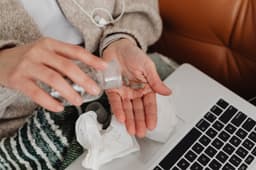Imagine feeling overwhelmed, exhausted, and disconnected from your baby, yet forcing a smile because you think you should “just be grateful.” This is postpartum depression (PPD), and you’re not alone. One in five moms experiences PPD, yet many suffer in silence, mistaking their symptoms for personal failure.
The truth? PPD isn’t your fault. It’s a medical condition rooted in hormonal shifts, stress, and biology, not weakness.
If you’re juggling sleepless nights, endless feedings, and a storm of emotions, the idea of “self-care” might feel laughable. But small, intentional steps can ease PPD’s weight. In this blog, you’ll learn how to reclaim calm and confidence with daily rituals that fit your chaotic new reality.
Understanding PPD
PPD gets tossed around a lot, but what does it really mean? Let’s cut through the noise: PPD isn’t laziness, weakness, or a parenting fail. It’s a medical condition affecting 15% of women, and understanding it is step one to healing.
In this section, we’ll break down what PPD is (and isn’t), how it differs from the baby blues, and why it’s okay to ask for help. No guilt. No shame. Just facts.
What Is Postpartum Depression?
Let’s start with the truth: PPD is not your fault. It’s a medical condition, not a character flaw or parenting failure.
To understand how to manage it, you need to know what it is and what it isn’t.
PPD vs. Baby Blues
You’ve probably heard of the “baby blues”, those tearful, moody days that hit 2–3 days after birth and fade within two weeks.
But PPD isn’t just an extended version of the blues.
Here’s the difference:
- Baby Blues: Caused by hormone crashes after birth. Symptoms include mild sadness, irritability, and fatigue.
- PPD: Lasts weeks or months. Symptoms include intense hopelessness, loss of interest in your baby, and physical exhaustion that sleep can’t fix.
Think of the baby blues like a passing rain shower. PPD? That’s a thunderstorm that lingers, soaking everything in its path.
Common Symptoms
PPD manifests differently for every mom. You might feel:
- Overwhelming sadness (cried for no reason today? That’s valid).
- Guilt or shame (“I should love this more, but I’m just tired”).
- Sleep disruptions (even when your baby sleeps).
- Loss of appetite or energy (forgetting to eat because the thought feels too heavy).
Risk Factors
Why does PPD happen? No single cause exists, but these factors increase risk:
- Hormonal shifts: Estrogen and progesterone drop sharply after birth.
- Lack of support: Feeling isolated or judged.
- Past mental health history: Anxiety, depression, or trauma.
- Sleep deprivation: Chronic fatigue weakens emotional resilience.
Recognizing these risks isn’t about blaming yourself. It’s about understanding why small steps matter.
Need a deeper dive into managing PPD with mindfulness? Explore 5 Mindfulness Techniques to Pair With PPD Medication.
The Power of Small Self-Care Steps
You might think self-care is just bubble baths and face masks, but here’s the truth: small, consistent actions rebuild your brain’s resilience.
Why Self-Care Works
Now that you understand PPD, let’s talk about the antidote: self-care. You might roll your eyes and ask, “How will a bubble bath fix this?”, but hear us out.
Self-care isn’t about luxury; it’s about practical, science-backed actions that rebuild your mental resilience, one small step at a time.
Self-Care ≠ Selfishness
Here’s a hard truth: You cannot pour from an empty cup. If you’re running on fumes, every interaction with your baby, partner, or even yourself feels heavier.
PPD thrives in isolation and exhaustion.
But when you prioritize even 5 minutes for yourself daily, you signal to your brain: “I matter.”
The Science Behind Self-Care
Self-care is a biological game-changer. Let’s break down why it works:
- Stress Reduction: Chronic stress spikes cortisol, worsening PPD symptoms. Simple acts like deep breathing or a 10-minute walk trigger your body’s relaxation response, lowering cortisol and calming your nervous system.
- Neuroplasticity: Small, repeated actions rewire your brain. For example, writing down one gratitude each day can slowly shift your mindset from “I’m failing” to “I’m trying.”
- Connection: Even just texting a friend releases oxytocin, the “bonding hormone,” which combats feelings of isolation.
Start Small, Stay Consistent
Think of self-care like a savings account: tiny deposits add up. You don’t need hours, but intentionality.
- Swap scrolling Instagram for 5 minutes of guided meditation.
- Brush your teeth and apply moisturizer—not because you need to “look put together,” but because the routine grounds you.
- Drink a full glass of water before your morning coffee. Hydration fuels brain function, which PPD often disrupts.
Want to see how self-care fits into your chaotic day? Check out these 5 mindfulness techniques that pair with PPD treatment.
5 Daily Self-Care Steps
You just need 5 small daily habits to start shifting PPD’s weight. These aren’t vague suggestions; they’re realistic, science-backed moves designed for the chaos of new motherhood.
Step 1: Take 5-Minute Breathing Breaks
“Inhale for 4 counts, hold for 4, exhale for 6—like deflating a balloon.”
Breathing isn’t just automatic; it’s your body’s reset button. When PPD floods you with overwhelm, slow, deep breaths trigger your parasympathetic nervous system.
How to do it:
- Set a kitchen timer for 5 minutes.
- Sit upright, close your eyes, and focus only on your breath.
- Inhale through your nose (4 seconds), hold (4 seconds), exhale through your mouth (6 seconds).
Why does it work?
Even one round lowers cortisol (the stress hormone) and clears brain fog. Do this after a tough feeding or before bedtime.
Step 2: Nap When Baby Naps (Really!)
“Sleep is a medicine for your mind.”
Newborns sleep in bursts for a reason: their brains can’t handle long stretches of wakefulness. Yours? Same thing.
Skipping naps because “there’s always something to do” worsens PPD symptoms.
How to do it:
- Drop everything when baby sleeps—even if it’s 10 minutes.
- Lie down, close your eyes, and let your body recharge.
Why does it work?
Sleep deprivation mimics mild cognitive impairment. Even 20 minutes of rest boosts mood and decision-making.
Expert Tip: Use a white noise machine to fall asleep faster.
Step 3: Move Your Body, Even Just 10 Minutes
Walk, stretch, or dance with your baby.
Exercise helps with chemical balance. Movement releases endorphins (natural mood boosters) and serotonin (the “feel-good” neurotransmitter).
How to do it:
- Do a 10-minute yoga flow while the baby lies on a blanket nearby.
- Strap baby into a carrier and stroll around the block.
Step 4: Eat One Nutrient-Rich Snack Daily
PPD depletes your energy reserves. Skipping meals spikes blood sugar, crashes, and worsens anxiety and irritability.
How to do it:
- Pre-portion snacks like nuts, hard-boiled eggs, or fruit with nut butter.
- Eat slowly, no scarfing while rocking the baby.
Why does it work?
Protein and healthy fats stabilize energy levels. Berries, rich in antioxidants, combat inflammation linked to depression.
Step 5: Connect with Another Mom (Even Online)
PPD thrives in silence. Social connection releases oxytocin (the “bonding hormone”), which combats isolation.
How to do it:
- Join a postpartum support group.
- Send a voice note to a fellow mom: “Can we chat for 10 minutes?”
Why does it work?
Sharing struggles normalizes them. You’re not alone—really.
Overcoming Common Barriers
Let’s be real: guilt, time crunches, and shame get in the way. You’re not lazy. You’re not broken. You’re just human.
No blame. No pressure. Just honest solutions.
How to Beat Guilt, Time Crunches, and Shame
PPD doesn’t just sap your energy; it wraps itself in guilt, shame, and the lie that you “should be fine by now.”
Let’s dismantle those barriers one by one.
Barrier 1: “I Don’t Have Time!”
“Self-care isn’t time stolen from your baby—it’s time invested in being present for them.”
You do have 5 minutes. Between feedings, during the baby’s nap, or even while nursing.
Fix it:
- Brush your teeth and splash cold water on your face to wake up.
- Do 3 deep breaths while waiting for the kettle to boil.
Barrier 2: Guilt
You’d never tell another mom she’s ‘failing’ for needing rest. Be that kind to yourself.
Guilt whispers, “I’m being selfish” or “I should be grateful.” But here’s the thing: rest isn’t a reward for perfection but a tool for survival.
Fix it:
- Reframe self-care as “parenting fuel.”
- Say out loud: “I deserve care because I’m human, not in spite of it.”
Barrier 3: Fear of Judgment
“PPD affects teachers, CEOs, and celebrities. You’re not broken—seeking help is brave.”
PPD thrives in silence. You might worry, “What if people think I’m a bad mom?” But here’s the reality: 1 in 5 moms experiences PPD, and help is how you heal.
Fix it:
- Join a PPD Support group.
- Text someone and have a conversation till you feel better
When to Seek Help
You’re doing the work, but sometimes, self-care isn’t enough. If PPD symptoms persist despite your efforts, it’s not a failure. It’s a sign you need extra support.
Signs That You Need Support
PPD isn’t something you can “tough out.” If you’re experiencing any of these, it’s time to reach out:
- Can’t eat, sleep, or care for yourself for days.
- Feelings of worthlessness or guilt that won’t lift.
- Thoughts of harming yourself or your baby. (If this is happening, call emergency services or go to the nearest ER immediately.)
You deserve to feel like yourself again. If PPD is still holding you back, let’s talk.




